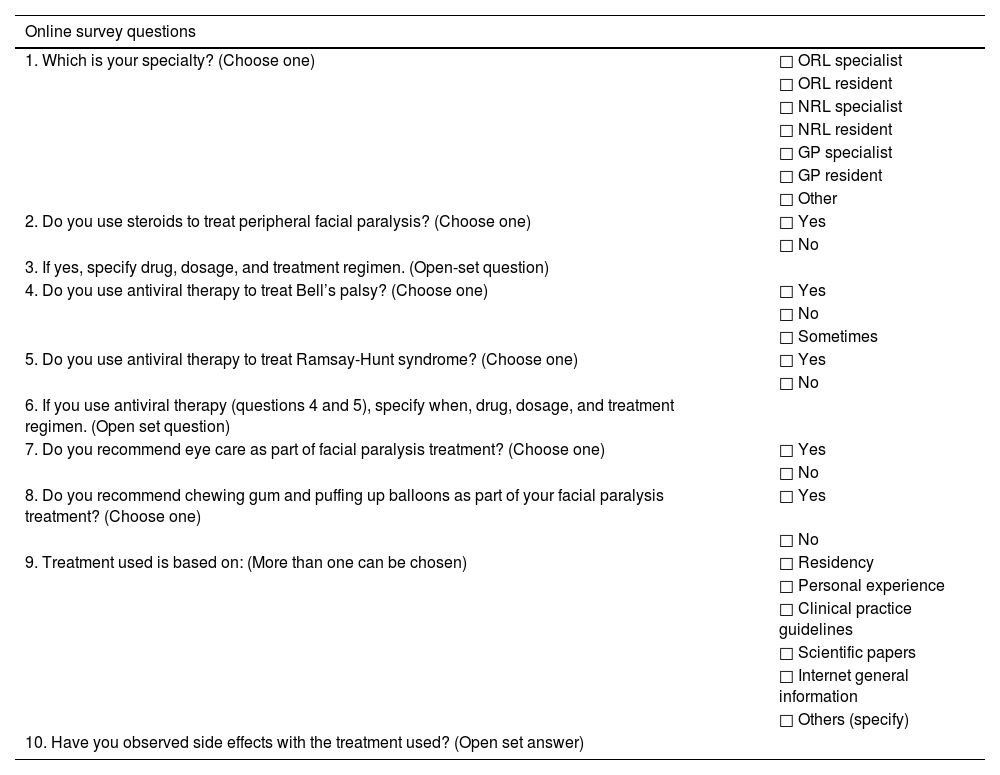Acute peripheral facial paralysis may be diagnosed and treated by different specialists.
ObjectiveThe aim of this study was to explore the variability in the treatment of Bell’s palsy (BP) and Ramsay Hunt Syndrome (RHS) among different medical specialties.
MethodsAn anonymous nationwide online survey was distributed among the Spanish Societies of Otorhinolaryngology (ORL), Neurology (NRL) and Family and Community Medicine (GP).
Results1039 responses were obtained. 98% agreed on using corticosteroids, ORL using higher doses than NRL and GP. Among all, only 13% prescribed antivirals in BP routinely, while 31% prescribed them occasionally. The percentage of specialists not using antivirals for RHS was 5% of ORL, 11% of NRL, and 23% of GP (GP vs. NRL p = 0.001; GP vs. ORL p < 0.0001; NRL vs. ORL p = 0,002). 99% recommended eye care. Exercises as chewing gum or blowing balloons were prescribed by 45% of the participants with statistically significant differences among the three specialties (GP vs. NRL p = 0.021; GP vs. ORL p < 0.0001; NRL vs. ORL p = 0.002).
ConclusionThere is general agreement in the use of corticosteroids and recommending eye care as part of the treatment of acute peripheral facial paralysis. Yet, there are discrepancies in corticosteroids dosage, use of antivirals and recommendation of facial exercises among specialties.
La parálisis facial periférica aguda puede ser diagnosticada y tratada por diferentes especialistas.
ObjetivoEl objetivo de este estudio es analizar la variabilidad entre especialidades en el tratamiento de la parálisis de Bell (PB) y del síndrome de Ramsay-Hunt (SRH).
MétodosSe distribuyó una encuesta anónima online entre los miembros de la Sociedad Española de Otorrinolaringología (ORL), la Sociedad Española de Neurología (NRL) y la Sociedad de Medicina Familiar y Comunitaria (MF).
ResultadosSe recopilaron 1039 respuestas. El 98% de los participantes coincidieron en el uso de corticoides, los ORL utilizaron dosis más altas que NRL y MF. Del total de encuestados, el 13% recomendaba antivirales en la PB de manera rutinaria, mientras que el 31% los recomendaba en ocasiones. El 5% de ORL, 11% de NRL, y 23% de MF (MF vs. NRL p = 0.001; MF vs. ORL p < 0.0001; NRL vs. ORL p = 0,002) no utilizaba antivirales en el tratamiento del SRH. El 99% de añadía cuidados del ojo al tratamiento de la parálisis facial. El 45% de los participantes aconsejaba ejercicios faciales como mascar chicle o inflar globos con diferencias estadísticamente significativas entre las tres especialidades (MF vs. NRL p = 0.021; MF vs. ORL p < 0.0001; NRL vs. ORL p = 0.002).
ConclusiónExiste acuerdo general en la utilización de corticoides y recomendar cuidados del ojo como parte del tratamiento de la parálisis facial periférica. A pesar de ello, existen diferencias en las dosis utilizadas, la utilización de antivirales o la recomendación de ejercicios faciales entre especialidades.












